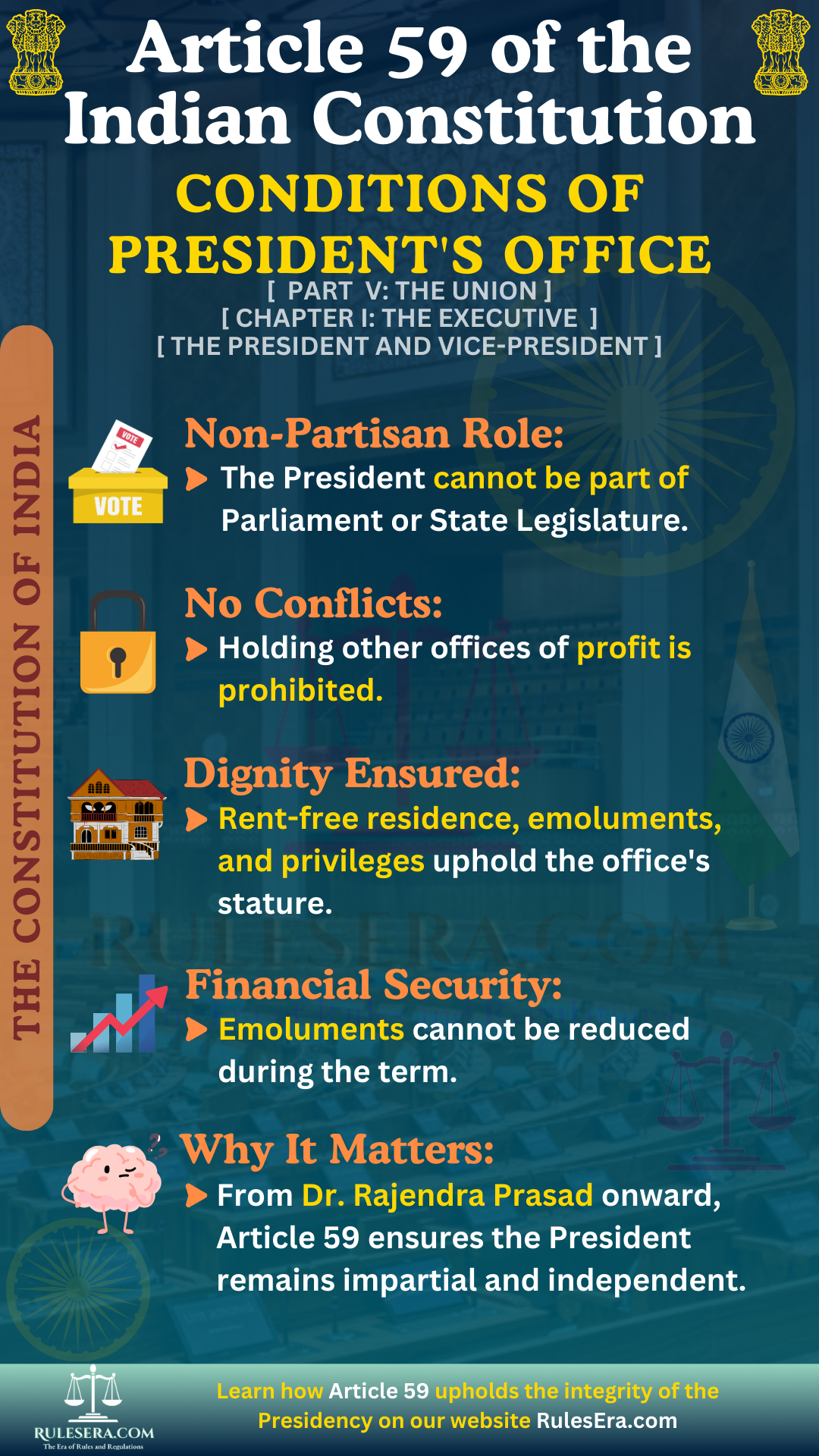Part V: The Union
Chapter I: The Executive
Article 59: Conditions of President's Office

--- Original Article ---
(1) The President shall not be a member of either House of Parliament or of a House of the Legislature of any State, and if a member of either House of Parliament or of a House of the Legislature of any State be elected President, he shall be deemed to have vacated his seat in that House on the date on which he enters upon his office as President.
(2) The President shall not hold any other office of profit.
(3) The President shall be entitled without payment of rent to the use of his official residences and shall be also entitled to such emoluments, allowances and privileges as may be determined by Parliament by law and, until provision in that behalf is so made, such emoluments, allowances and privileges as are specified in the Second Schedule.
(4) The emoluments and allowances of the President shall not be diminished during his term of office.
Explanation
Article 59 of the Constitution of India lays down the conditions under which the President holds office. These provisions ensure the separation of powers, prevent conflicts of interest, and provide the necessary privileges for the President to discharge duties with dignity.
Key Provisions
- Clause (1): Ineligibility for Legislative Membership: The President cannot be a member of Parliament or a State Legislature. If a legislator is elected as President, they must vacate their seat upon assuming office.
- Clause (2): No Office of Profit: The President cannot hold any other office of profit, ensuring impartiality and freedom from financial influence.
- Clause (3): Official Residences and Emoluments: The President is entitled to official residences rent-free, and emoluments, allowances, and privileges as determined by Parliament.
- Clause (4): Protection of Emoluments: The President's emoluments cannot be reduced during their tenure, maintaining financial independence and integrity.
Amendments and Real-Life Examples
- Amendments: Article 59 has not undergone significant amendments, as its provisions have effectively upheld the office's dignity and impartiality. However, the emoluments and allowances of the President have been periodically updated by Parliament.
- Real-Life Example: When Dr. Rajendra Prasad, India’s first President, was elected, he vacated all other official roles, upholding the sanctity of Article 59. This practice has been consistently followed by all Presidents, ensuring impartiality.
Historical Significance
Article 59 reflects the framers' vision of maintaining the President's impartiality and independence. By preventing any conflicts of interest and ensuring the President has adequate support and protections, this article secures the dignity and effectiveness of the highest office in the Republic of India.
Legislative History
Article 59, initially drafted as Article 48, underwent little deliberation on December 27, 1948 and October 14, 1949 before being incorporated into the Indian Constitution.
Debates and Deliberations
During the Constituent Assembly debates on Article 48 (now Article 59), several amendments were proposed to refine the conditions of the President’s office. Shri V. S. Sarwate suggested an amendment requiring any member of a ruling family receiving a political pension or privy purse to forfeit these allowances if elected as President. He argued that the President should embody republican ideals and must not be tied to monarchic traditions.
Shri H. V. Kamath proposed removing the phrase "the President shall have an official residence," arguing that such provisions are unnecessary in the Constitution, citing examples from the U.S. and U.K. However, Dr. B. R. Ambedkar rejected this proposal, stating that it followed the precedent set by the Government of India Act.
Prof. K. T. Shah introduced two amendments: one to provide secretarial and expert assistance to the President at public expense, and another suggesting the President receive a pension upon completion of their term. Dr. Ambedkar dismissed both proposals, assuring that support would be provided as needed, and argued that a pension could complicate situations where a former President might seek re-election.
Ultimately, the Assembly adopted Article 59 in its current form, ensuring the independence, impartiality, and dignity of the President’s office.
Frequently Asked Questions (FAQs):
No, Article 59 explicitly states that the President cannot hold any other office of profit while serving in the role, ensuring impartiality and preventing conflicts of interest.
Upon being elected as President, the individual must vacate their seat in Parliament or any State Legislature on the date they assume the office of President.
No, Article 59 protects the President’s emoluments and allowances from being diminished during their term, ensuring financial independence and stability.